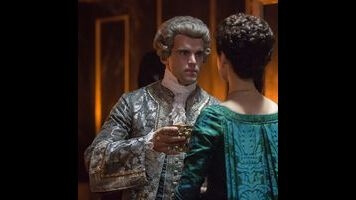Flashbacks are a tricky thing to pull off. None of the ones in “Faith” work. I’m of the firm belief that flashbacks within an episode to something that happened in that episode should be outlawed. (How To Get Away With Murder is guilty of this far too often.) At episode’s end, Claire flashes back to being in the hospital, and at least it all leads to a part we haven’t seen yet, but those initial silent pops to the breaking Virgin Mary and Claire screaming for her baby aren’t nearly as visually compelling as director Metin Hüseyin seems to think they are. And the Virgin Mary breaking was overt enough of symbolism the first time around. A second just makes it hokey.
“Faith” does do one thing immaculately well: It gets right into Claire’s head and situates itself there, probing the different layers of her brain and providing an emotionally tumultuous episode that is so sharply in tune with the heroine’s psyche. The episode begins in Claire’s perspective, as she comes to in the hospital and first realizes the possibility that she could lose the baby. From there, it only gets more devastating, and “Faith” allows the pacing to be slow in order for the full impact of the episode to really hit. It’s a cautious, meandering episode that gives all the emotional beats so much room to breathe. Its best moments are its quietest ones, like when Claire touches her apostle spoons, taking in all that they represent and mourning what has been lost without saying so much as a word. Here’s where Outlander often shines and distinguishes itself from other action-adventure dramas that look similar on the surface. Outlander puts feelings first, way ahead of the action, way ahead of the plot. When it doesn’t, it’s starkly noticeable. Not all the direction choices of “Faith” work, but overall, it’s a haunting episode, and Caitriona Balfe is in full command of every scene. It’s a taxing episode for her, with so much of the narrative hinged on Claire and, more specifically, Claire’s inner-self. But she’s more than up to the challenge. She elevates it all with a performance surely deserving of awards consideration.
It’s a strange episode, too. Outlander is often a strange show, meandering down unexpected tangents that have almost more to do with mood than story. Claire makes a desperate plea for Jamie’s freedom with the king of France and ends up having to sleep with him in order to get what she wants. But she also has to do something else: The king leads her down a hidden hallway to some sort of execution room where he asks for her professional opinion on whether St. Germain and Master Raymond—both of whom have been arrested for practicing the dark arts—should be punished by death. I tend to love when Claire goes full witch, like when she whispered Black Jack’s date of death into his ear last season. And it’s admittedly quite fun here when Claire cops to being a white witch even though she’s just manipulating everyone in order to control the situation. The scene puts power back in Claire’s hands—only to then rip it away when the king makes it clear that sex is also part of her payment. It’s an odd and anticlimactic demise for St. Germain, but the whole scene is masterfully staged. It’s slow and tense, like a lot of the episode, giving full weight to what is about to happen and not just filling the space with unnecessary dialogue. “Faith” manages to have restraint in so many other parts of its narrative, which makes that rape flashback all the more gratuitous.
Stray observations
- As Master Raymond’s taken away, Claire recalls a line from The Wizard Of Oz, said by Dorothy to the Scarecrow: “I’m going to miss you most of all.” It’s a nice little reminder that Claire is not of this time—one that’s a little more intimate and emotional than just her advanced medical knowledge.
- I like that it’s Louise who comes to Claire’s bedside. It’s an unexpected role for her, and yet, she really is Claire’s only friend in Paris.
- I must admit that I don’t fully understand the opening scene of the episode. Claire’s in 1950s Boston with her daughter Faith…is this what that timeline would look like if Faith had lived? Or is Claire going to have another child named Faith? It must be the latter, since Claire shows up pregnant when she’s reunited with Frank, right?
- I’m drawn to Master Raymond only insofar as I don’t quite understand him, which is why Claire seems drawn to him, too. He promises that we’ll meet again, and I hope that’s true, because I need answers.
- The way Jamie is first shot as he’s returning home, so that we can’t quite make out his face, is a really nice choice.
- Claire finally acknowledges she’s at fault for a lot of the bad that has happened. Maybe she’ll finally stop putting Frank ahead of everything?
- I’m so glad Claire and Jamie are going back to Scotland. That was a long time coming.

